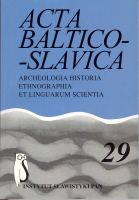Czy polszczyzna północnokresowa jest monolitem językowym?
Is the Polish language vocabulary in the borderland region a linguistic monolith?
Author(s): Koji MoritaSubject(s): Language and Literature Studies
Published by: Instytut Slawistyki Polskiej Akademii Nauk
Keywords: regional Polish language; Trakai region; Ivjanec region; sociolinguistic method
Summary/Abstract: In this article the author brings up for discussion the consolidated knowledge in the society of Polish and Slavic linguistics for many years: “the Polish dialects spoken in Lithuania and Belarus are uniform in linguistic quality”. Analyzing transcribed materials from the speech of the older Polish generations of the Trakai region in Lithuania and the Ivjanec region in Belarus (100 pages from each region) the author shows frequency data on three linguistic features. The phonetic change from e to a (akan’e) and the end of the genitive case in the plural -ów occur more frequently in the speech of the Trakai region than that of the Ivjanec region. The author particularly highlights the lack of the perfective particle -wszy in the dialect of the Ivjanec region. In light of the high frequency of these features in the dialect of the Trakai re- gion the author suggests that we have to pay more attention to the Lithuanian origin of them, and it is impossible to research the Polish language spoken in the north- eastern borderland without sociolinguistic methods. Presenting the findings of the linguistic research the author verifies that the Belarusian and Lithuanian variants of the Polish language are not uniform.
Journal: Acta Baltico Slavica
- Issue Year: 2005
- Issue No: 29
- Page Range: 139-146
- Page Count: 8
- Language: Polish

